Post-Residency Written Project: Ethics, Leadership, and Sustainability
VerifiedAdded on 2021/02/21
|10
|3536
|32
Report
AI Summary
This report examines ethics, responsibility, and sustainability in the context of corruption in Morocco. It explores the significance of ethical principles, including deontology, consequentialism, and virtue ethics, and how they relate to anti-corruption efforts. The report analyzes the challenges of corruption in Morocco, emphasizing the impact on business sustainability. It investigates leadership models and partnership strategies, including the leadership/managerial grid and the four-framework approach, to address ethical issues. It also reflects on experiential learning gained from working within the local community to combat corruption. The report highlights the importance of integrating ethical and responsible behavior to reduce corruption and promote sustainable development, offering insights into potential solutions and strategies for a more ethical business environment in Morocco.
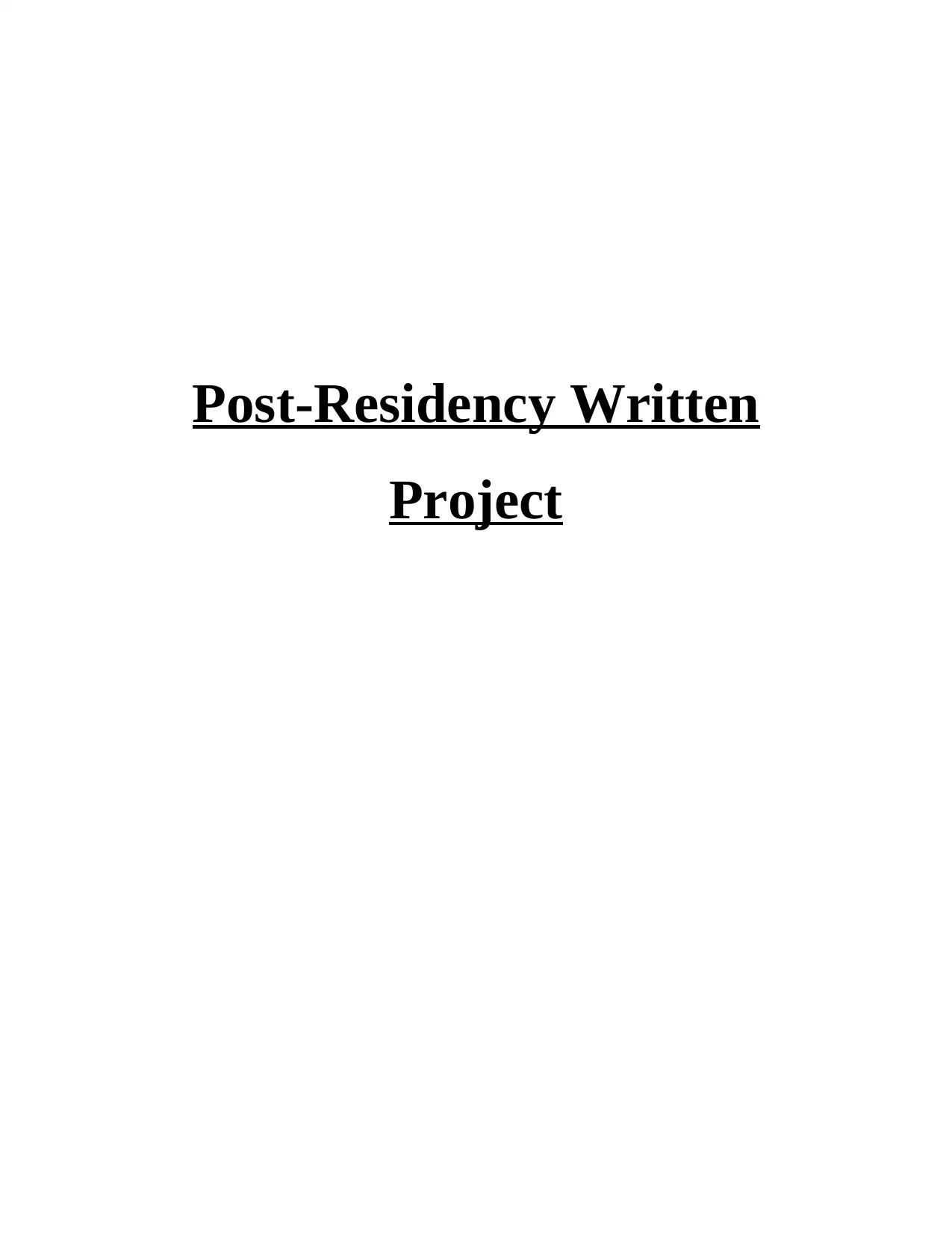
Post-Residency Written
Project
Project
Paraphrase This Document
Need a fresh take? Get an instant paraphrase of this document with our AI Paraphraser
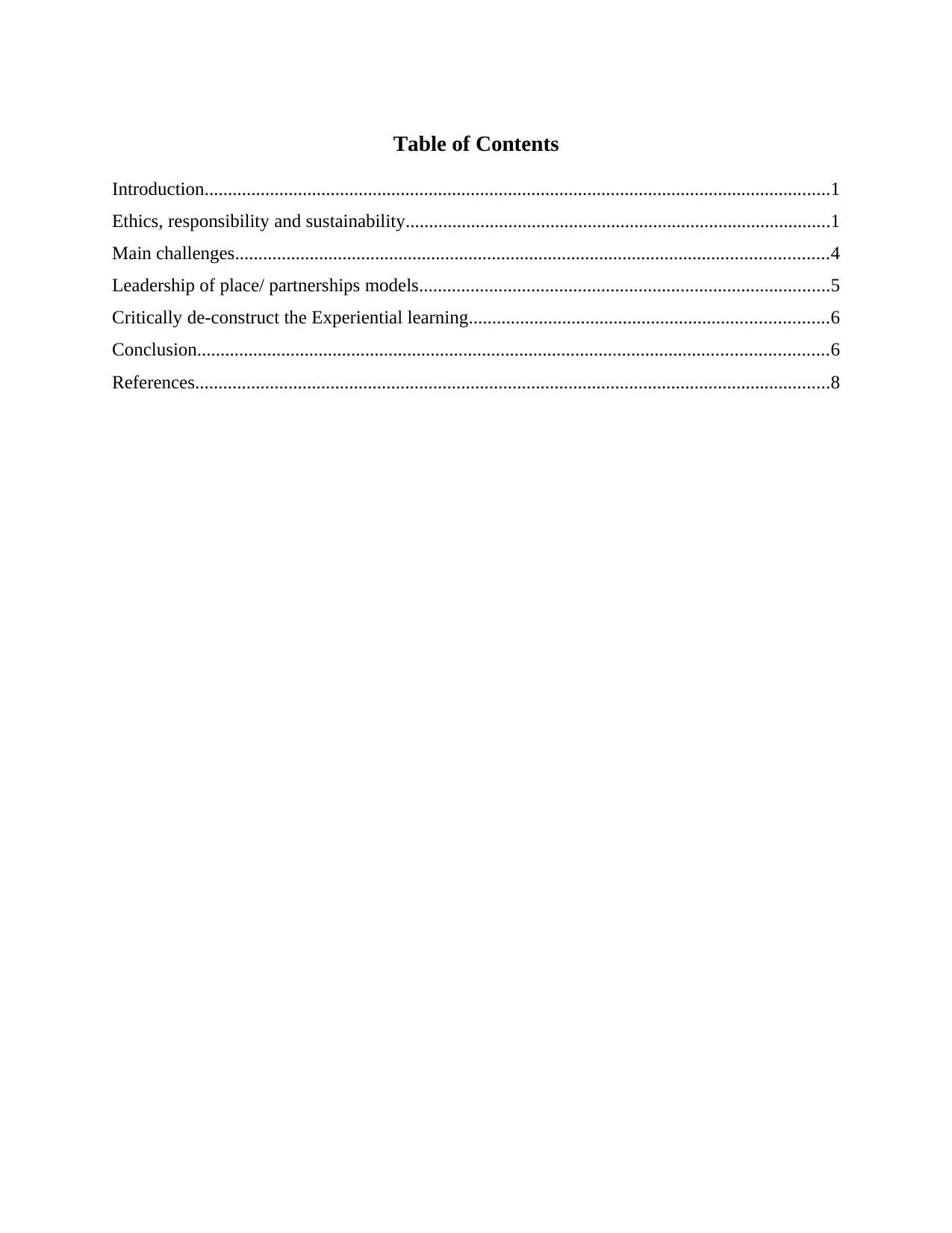
Table of Contents
Introduction......................................................................................................................................1
Ethics, responsibility and sustainability...........................................................................................1
Main challenges...............................................................................................................................4
Leadership of place/ partnerships models........................................................................................5
Critically de-construct the Experiential learning.............................................................................6
Conclusion.......................................................................................................................................6
References........................................................................................................................................8
Introduction......................................................................................................................................1
Ethics, responsibility and sustainability...........................................................................................1
Main challenges...............................................................................................................................4
Leadership of place/ partnerships models........................................................................................5
Critically de-construct the Experiential learning.............................................................................6
Conclusion.......................................................................................................................................6
References........................................................................................................................................8
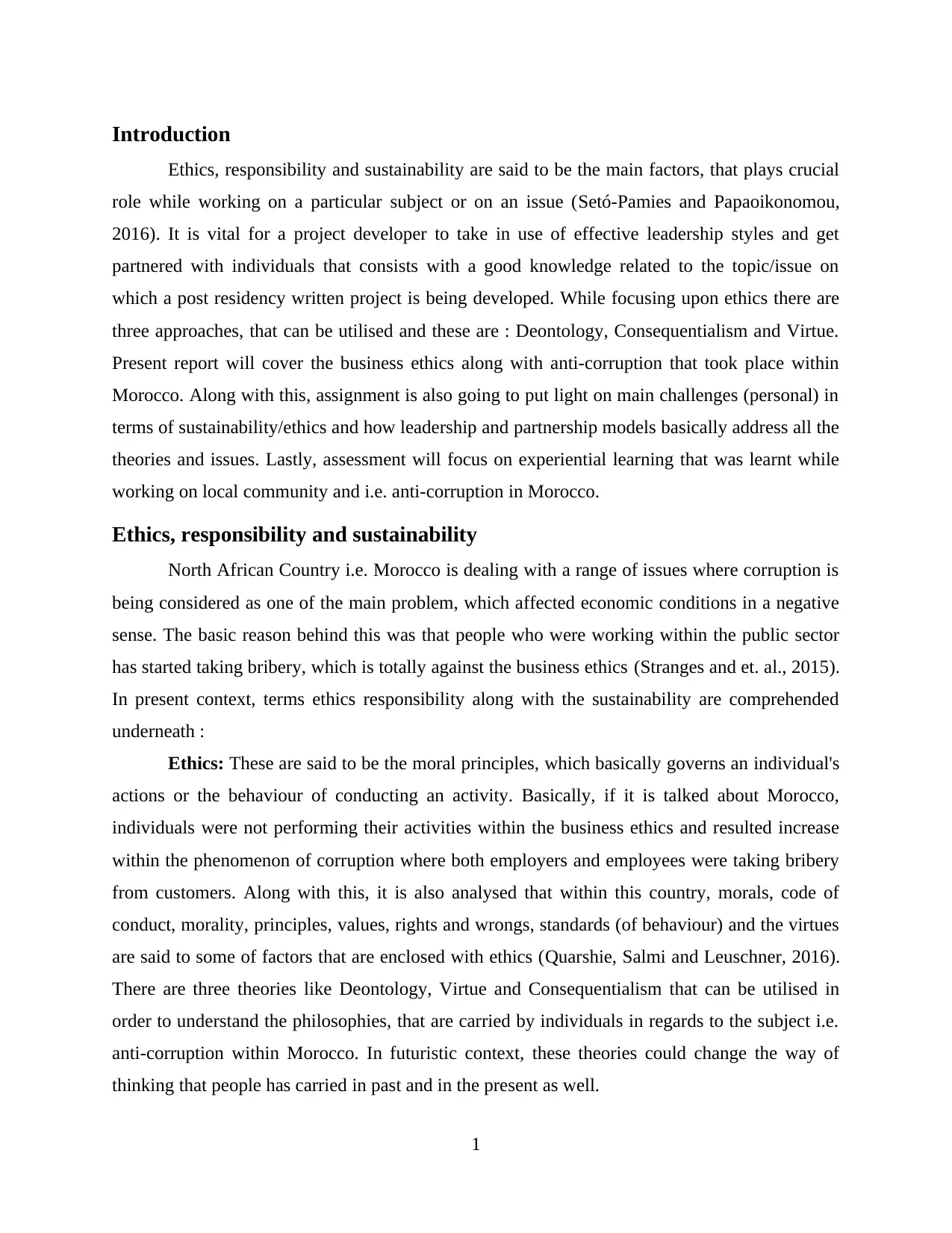
Introduction
Ethics, responsibility and sustainability are said to be the main factors, that plays crucial
role while working on a particular subject or on an issue (Setó-Pamies and Papaoikonomou,
2016). It is vital for a project developer to take in use of effective leadership styles and get
partnered with individuals that consists with a good knowledge related to the topic/issue on
which a post residency written project is being developed. While focusing upon ethics there are
three approaches, that can be utilised and these are : Deontology, Consequentialism and Virtue.
Present report will cover the business ethics along with anti-corruption that took place within
Morocco. Along with this, assignment is also going to put light on main challenges (personal) in
terms of sustainability/ethics and how leadership and partnership models basically address all the
theories and issues. Lastly, assessment will focus on experiential learning that was learnt while
working on local community and i.e. anti-corruption in Morocco.
Ethics, responsibility and sustainability
North African Country i.e. Morocco is dealing with a range of issues where corruption is
being considered as one of the main problem, which affected economic conditions in a negative
sense. The basic reason behind this was that people who were working within the public sector
has started taking bribery, which is totally against the business ethics (Stranges and et. al., 2015).
In present context, terms ethics responsibility along with the sustainability are comprehended
underneath :
Ethics: These are said to be the moral principles, which basically governs an individual's
actions or the behaviour of conducting an activity. Basically, if it is talked about Morocco,
individuals were not performing their activities within the business ethics and resulted increase
within the phenomenon of corruption where both employers and employees were taking bribery
from customers. Along with this, it is also analysed that within this country, morals, code of
conduct, morality, principles, values, rights and wrongs, standards (of behaviour) and the virtues
are said to some of factors that are enclosed with ethics (Quarshie, Salmi and Leuschner, 2016).
There are three theories like Deontology, Virtue and Consequentialism that can be utilised in
order to understand the philosophies, that are carried by individuals in regards to the subject i.e.
anti-corruption within Morocco. In futuristic context, these theories could change the way of
thinking that people has carried in past and in the present as well.
1
Ethics, responsibility and sustainability are said to be the main factors, that plays crucial
role while working on a particular subject or on an issue (Setó-Pamies and Papaoikonomou,
2016). It is vital for a project developer to take in use of effective leadership styles and get
partnered with individuals that consists with a good knowledge related to the topic/issue on
which a post residency written project is being developed. While focusing upon ethics there are
three approaches, that can be utilised and these are : Deontology, Consequentialism and Virtue.
Present report will cover the business ethics along with anti-corruption that took place within
Morocco. Along with this, assignment is also going to put light on main challenges (personal) in
terms of sustainability/ethics and how leadership and partnership models basically address all the
theories and issues. Lastly, assessment will focus on experiential learning that was learnt while
working on local community and i.e. anti-corruption in Morocco.
Ethics, responsibility and sustainability
North African Country i.e. Morocco is dealing with a range of issues where corruption is
being considered as one of the main problem, which affected economic conditions in a negative
sense. The basic reason behind this was that people who were working within the public sector
has started taking bribery, which is totally against the business ethics (Stranges and et. al., 2015).
In present context, terms ethics responsibility along with the sustainability are comprehended
underneath :
Ethics: These are said to be the moral principles, which basically governs an individual's
actions or the behaviour of conducting an activity. Basically, if it is talked about Morocco,
individuals were not performing their activities within the business ethics and resulted increase
within the phenomenon of corruption where both employers and employees were taking bribery
from customers. Along with this, it is also analysed that within this country, morals, code of
conduct, morality, principles, values, rights and wrongs, standards (of behaviour) and the virtues
are said to some of factors that are enclosed with ethics (Quarshie, Salmi and Leuschner, 2016).
There are three theories like Deontology, Virtue and Consequentialism that can be utilised in
order to understand the philosophies, that are carried by individuals in regards to the subject i.e.
anti-corruption within Morocco. In futuristic context, these theories could change the way of
thinking that people has carried in past and in the present as well.
1
⊘ This is a preview!⊘
Do you want full access?
Subscribe today to unlock all pages.

Trusted by 1+ million students worldwide
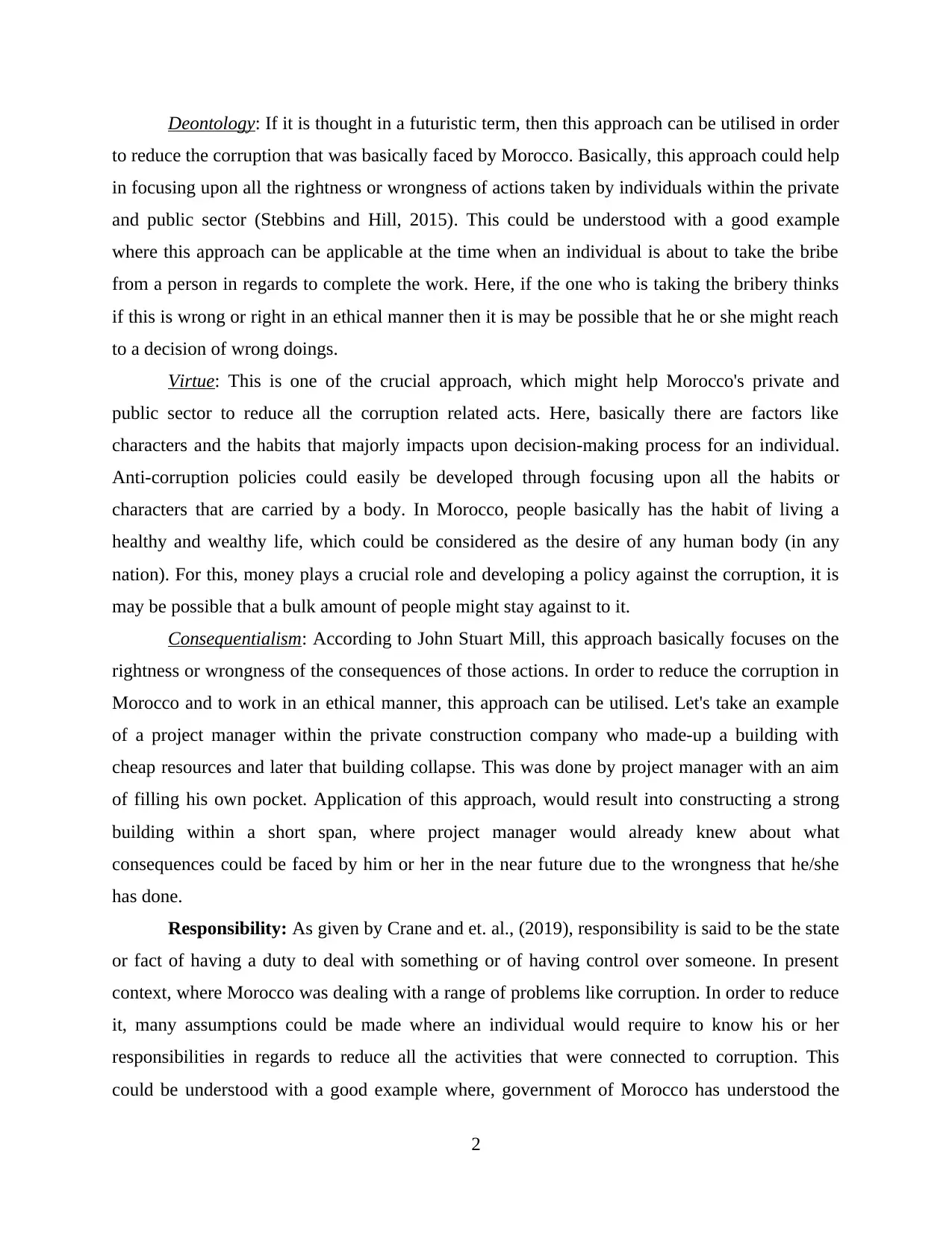
Deontology: If it is thought in a futuristic term, then this approach can be utilised in order
to reduce the corruption that was basically faced by Morocco. Basically, this approach could help
in focusing upon all the rightness or wrongness of actions taken by individuals within the private
and public sector (Stebbins and Hill, 2015). This could be understood with a good example
where this approach can be applicable at the time when an individual is about to take the bribe
from a person in regards to complete the work. Here, if the one who is taking the bribery thinks
if this is wrong or right in an ethical manner then it is may be possible that he or she might reach
to a decision of wrong doings.
Virtue: This is one of the crucial approach, which might help Morocco's private and
public sector to reduce all the corruption related acts. Here, basically there are factors like
characters and the habits that majorly impacts upon decision-making process for an individual.
Anti-corruption policies could easily be developed through focusing upon all the habits or
characters that are carried by a body. In Morocco, people basically has the habit of living a
healthy and wealthy life, which could be considered as the desire of any human body (in any
nation). For this, money plays a crucial role and developing a policy against the corruption, it is
may be possible that a bulk amount of people might stay against to it.
Consequentialism: According to John Stuart Mill, this approach basically focuses on the
rightness or wrongness of the consequences of those actions. In order to reduce the corruption in
Morocco and to work in an ethical manner, this approach can be utilised. Let's take an example
of a project manager within the private construction company who made-up a building with
cheap resources and later that building collapse. This was done by project manager with an aim
of filling his own pocket. Application of this approach, would result into constructing a strong
building within a short span, where project manager would already knew about what
consequences could be faced by him or her in the near future due to the wrongness that he/she
has done.
Responsibility: As given by Crane and et. al., (2019), responsibility is said to be the state
or fact of having a duty to deal with something or of having control over someone. In present
context, where Morocco was dealing with a range of problems like corruption. In order to reduce
it, many assumptions could be made where an individual would require to know his or her
responsibilities in regards to reduce all the activities that were connected to corruption. This
could be understood with a good example where, government of Morocco has understood the
2
to reduce the corruption that was basically faced by Morocco. Basically, this approach could help
in focusing upon all the rightness or wrongness of actions taken by individuals within the private
and public sector (Stebbins and Hill, 2015). This could be understood with a good example
where this approach can be applicable at the time when an individual is about to take the bribe
from a person in regards to complete the work. Here, if the one who is taking the bribery thinks
if this is wrong or right in an ethical manner then it is may be possible that he or she might reach
to a decision of wrong doings.
Virtue: This is one of the crucial approach, which might help Morocco's private and
public sector to reduce all the corruption related acts. Here, basically there are factors like
characters and the habits that majorly impacts upon decision-making process for an individual.
Anti-corruption policies could easily be developed through focusing upon all the habits or
characters that are carried by a body. In Morocco, people basically has the habit of living a
healthy and wealthy life, which could be considered as the desire of any human body (in any
nation). For this, money plays a crucial role and developing a policy against the corruption, it is
may be possible that a bulk amount of people might stay against to it.
Consequentialism: According to John Stuart Mill, this approach basically focuses on the
rightness or wrongness of the consequences of those actions. In order to reduce the corruption in
Morocco and to work in an ethical manner, this approach can be utilised. Let's take an example
of a project manager within the private construction company who made-up a building with
cheap resources and later that building collapse. This was done by project manager with an aim
of filling his own pocket. Application of this approach, would result into constructing a strong
building within a short span, where project manager would already knew about what
consequences could be faced by him or her in the near future due to the wrongness that he/she
has done.
Responsibility: As given by Crane and et. al., (2019), responsibility is said to be the state
or fact of having a duty to deal with something or of having control over someone. In present
context, where Morocco was dealing with a range of problems like corruption. In order to reduce
it, many assumptions could be made where an individual would require to know his or her
responsibilities in regards to reduce all the activities that were connected to corruption. This
could be understood with a good example where, government of Morocco has understood the
2
Paraphrase This Document
Need a fresh take? Get an instant paraphrase of this document with our AI Paraphraser
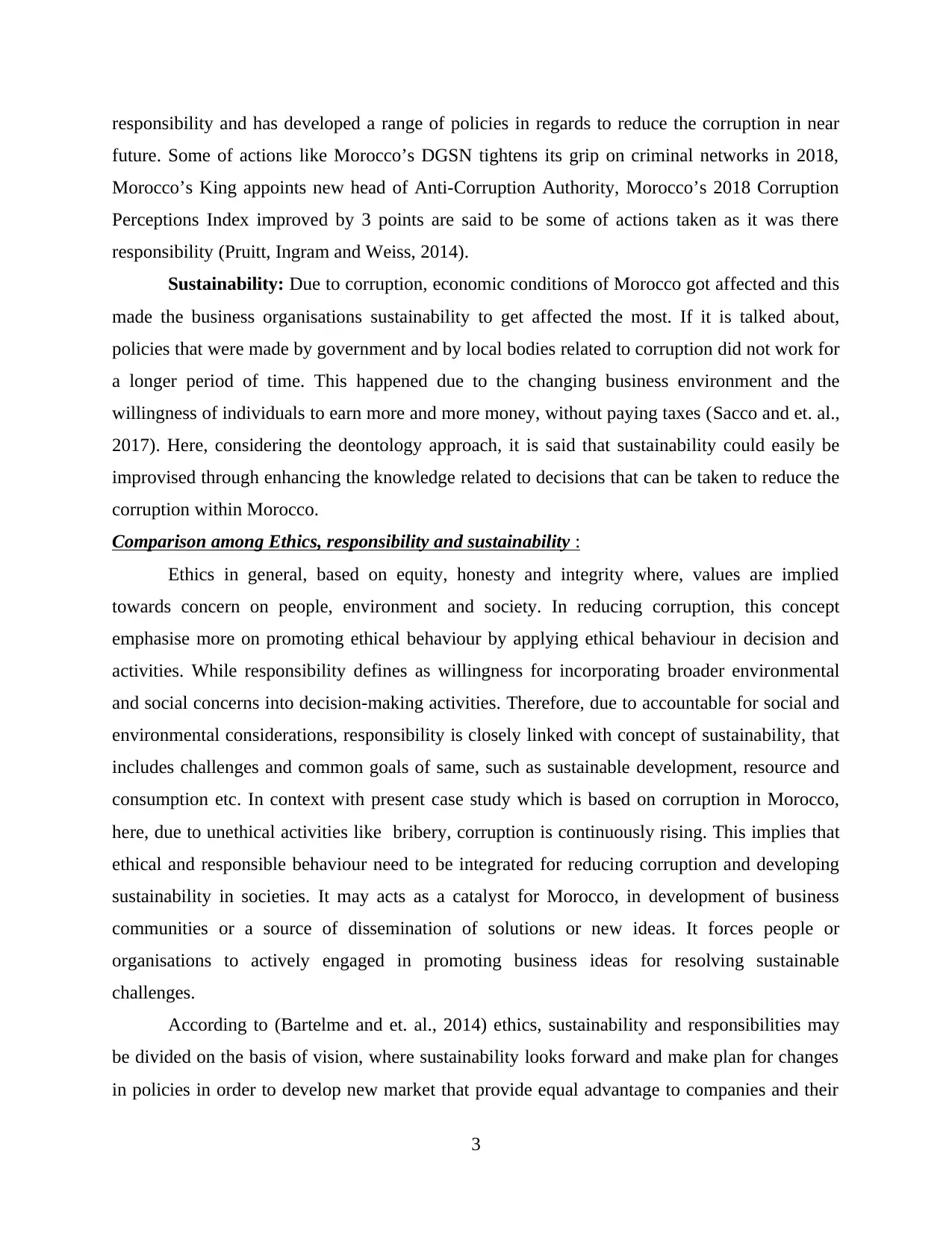
responsibility and has developed a range of policies in regards to reduce the corruption in near
future. Some of actions like Morocco’s DGSN tightens its grip on criminal networks in 2018,
Morocco’s King appoints new head of Anti-Corruption Authority, Morocco’s 2018 Corruption
Perceptions Index improved by 3 points are said to be some of actions taken as it was there
responsibility (Pruitt, Ingram and Weiss, 2014).
Sustainability: Due to corruption, economic conditions of Morocco got affected and this
made the business organisations sustainability to get affected the most. If it is talked about,
policies that were made by government and by local bodies related to corruption did not work for
a longer period of time. This happened due to the changing business environment and the
willingness of individuals to earn more and more money, without paying taxes (Sacco and et. al.,
2017). Here, considering the deontology approach, it is said that sustainability could easily be
improvised through enhancing the knowledge related to decisions that can be taken to reduce the
corruption within Morocco.
Comparison among Ethics, responsibility and sustainability :
Ethics in general, based on equity, honesty and integrity where, values are implied
towards concern on people, environment and society. In reducing corruption, this concept
emphasise more on promoting ethical behaviour by applying ethical behaviour in decision and
activities. While responsibility defines as willingness for incorporating broader environmental
and social concerns into decision-making activities. Therefore, due to accountable for social and
environmental considerations, responsibility is closely linked with concept of sustainability, that
includes challenges and common goals of same, such as sustainable development, resource and
consumption etc. In context with present case study which is based on corruption in Morocco,
here, due to unethical activities like bribery, corruption is continuously rising. This implies that
ethical and responsible behaviour need to be integrated for reducing corruption and developing
sustainability in societies. It may acts as a catalyst for Morocco, in development of business
communities or a source of dissemination of solutions or new ideas. It forces people or
organisations to actively engaged in promoting business ideas for resolving sustainable
challenges.
According to (Bartelme and et. al., 2014) ethics, sustainability and responsibilities may
be divided on the basis of vision, where sustainability looks forward and make plan for changes
in policies in order to develop new market that provide equal advantage to companies and their
3
future. Some of actions like Morocco’s DGSN tightens its grip on criminal networks in 2018,
Morocco’s King appoints new head of Anti-Corruption Authority, Morocco’s 2018 Corruption
Perceptions Index improved by 3 points are said to be some of actions taken as it was there
responsibility (Pruitt, Ingram and Weiss, 2014).
Sustainability: Due to corruption, economic conditions of Morocco got affected and this
made the business organisations sustainability to get affected the most. If it is talked about,
policies that were made by government and by local bodies related to corruption did not work for
a longer period of time. This happened due to the changing business environment and the
willingness of individuals to earn more and more money, without paying taxes (Sacco and et. al.,
2017). Here, considering the deontology approach, it is said that sustainability could easily be
improvised through enhancing the knowledge related to decisions that can be taken to reduce the
corruption within Morocco.
Comparison among Ethics, responsibility and sustainability :
Ethics in general, based on equity, honesty and integrity where, values are implied
towards concern on people, environment and society. In reducing corruption, this concept
emphasise more on promoting ethical behaviour by applying ethical behaviour in decision and
activities. While responsibility defines as willingness for incorporating broader environmental
and social concerns into decision-making activities. Therefore, due to accountable for social and
environmental considerations, responsibility is closely linked with concept of sustainability, that
includes challenges and common goals of same, such as sustainable development, resource and
consumption etc. In context with present case study which is based on corruption in Morocco,
here, due to unethical activities like bribery, corruption is continuously rising. This implies that
ethical and responsible behaviour need to be integrated for reducing corruption and developing
sustainability in societies. It may acts as a catalyst for Morocco, in development of business
communities or a source of dissemination of solutions or new ideas. It forces people or
organisations to actively engaged in promoting business ideas for resolving sustainable
challenges.
According to (Bartelme and et. al., 2014) ethics, sustainability and responsibilities may
be divided on the basis of vision, where sustainability looks forward and make plan for changes
in policies in order to develop new market that provide equal advantage to companies and their
3
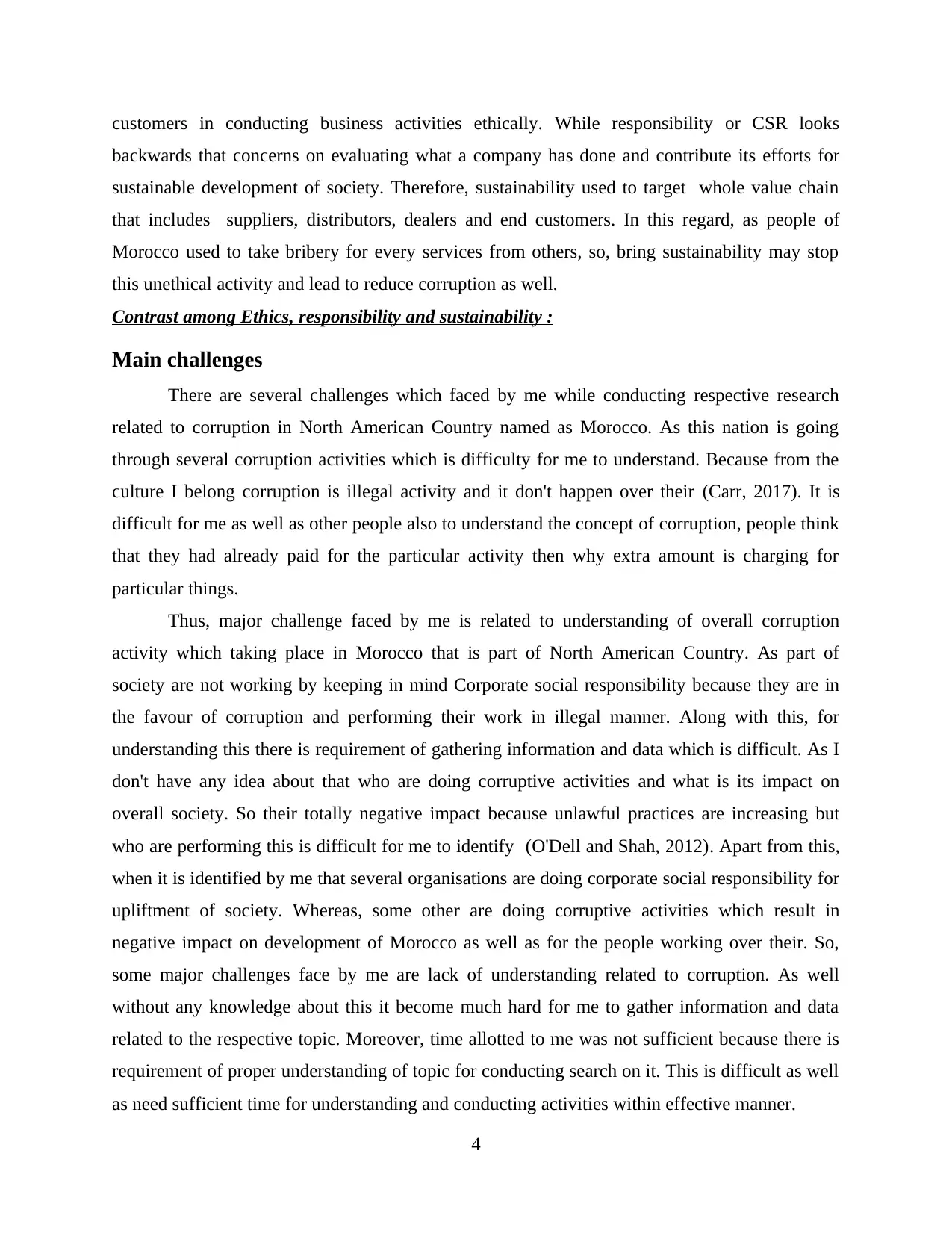
customers in conducting business activities ethically. While responsibility or CSR looks
backwards that concerns on evaluating what a company has done and contribute its efforts for
sustainable development of society. Therefore, sustainability used to target whole value chain
that includes suppliers, distributors, dealers and end customers. In this regard, as people of
Morocco used to take bribery for every services from others, so, bring sustainability may stop
this unethical activity and lead to reduce corruption as well.
Contrast among Ethics, responsibility and sustainability :
Main challenges
There are several challenges which faced by me while conducting respective research
related to corruption in North American Country named as Morocco. As this nation is going
through several corruption activities which is difficulty for me to understand. Because from the
culture I belong corruption is illegal activity and it don't happen over their (Carr, 2017). It is
difficult for me as well as other people also to understand the concept of corruption, people think
that they had already paid for the particular activity then why extra amount is charging for
particular things.
Thus, major challenge faced by me is related to understanding of overall corruption
activity which taking place in Morocco that is part of North American Country. As part of
society are not working by keeping in mind Corporate social responsibility because they are in
the favour of corruption and performing their work in illegal manner. Along with this, for
understanding this there is requirement of gathering information and data which is difficult. As I
don't have any idea about that who are doing corruptive activities and what is its impact on
overall society. So their totally negative impact because unlawful practices are increasing but
who are performing this is difficult for me to identify (O'Dell and Shah, 2012). Apart from this,
when it is identified by me that several organisations are doing corporate social responsibility for
upliftment of society. Whereas, some other are doing corruptive activities which result in
negative impact on development of Morocco as well as for the people working over their. So,
some major challenges face by me are lack of understanding related to corruption. As well
without any knowledge about this it become much hard for me to gather information and data
related to the respective topic. Moreover, time allotted to me was not sufficient because there is
requirement of proper understanding of topic for conducting search on it. This is difficult as well
as need sufficient time for understanding and conducting activities within effective manner.
4
backwards that concerns on evaluating what a company has done and contribute its efforts for
sustainable development of society. Therefore, sustainability used to target whole value chain
that includes suppliers, distributors, dealers and end customers. In this regard, as people of
Morocco used to take bribery for every services from others, so, bring sustainability may stop
this unethical activity and lead to reduce corruption as well.
Contrast among Ethics, responsibility and sustainability :
Main challenges
There are several challenges which faced by me while conducting respective research
related to corruption in North American Country named as Morocco. As this nation is going
through several corruption activities which is difficulty for me to understand. Because from the
culture I belong corruption is illegal activity and it don't happen over their (Carr, 2017). It is
difficult for me as well as other people also to understand the concept of corruption, people think
that they had already paid for the particular activity then why extra amount is charging for
particular things.
Thus, major challenge faced by me is related to understanding of overall corruption
activity which taking place in Morocco that is part of North American Country. As part of
society are not working by keeping in mind Corporate social responsibility because they are in
the favour of corruption and performing their work in illegal manner. Along with this, for
understanding this there is requirement of gathering information and data which is difficult. As I
don't have any idea about that who are doing corruptive activities and what is its impact on
overall society. So their totally negative impact because unlawful practices are increasing but
who are performing this is difficult for me to identify (O'Dell and Shah, 2012). Apart from this,
when it is identified by me that several organisations are doing corporate social responsibility for
upliftment of society. Whereas, some other are doing corruptive activities which result in
negative impact on development of Morocco as well as for the people working over their. So,
some major challenges face by me are lack of understanding related to corruption. As well
without any knowledge about this it become much hard for me to gather information and data
related to the respective topic. Moreover, time allotted to me was not sufficient because there is
requirement of proper understanding of topic for conducting search on it. This is difficult as well
as need sufficient time for understanding and conducting activities within effective manner.
4
⊘ This is a preview!⊘
Do you want full access?
Subscribe today to unlock all pages.

Trusted by 1+ million students worldwide
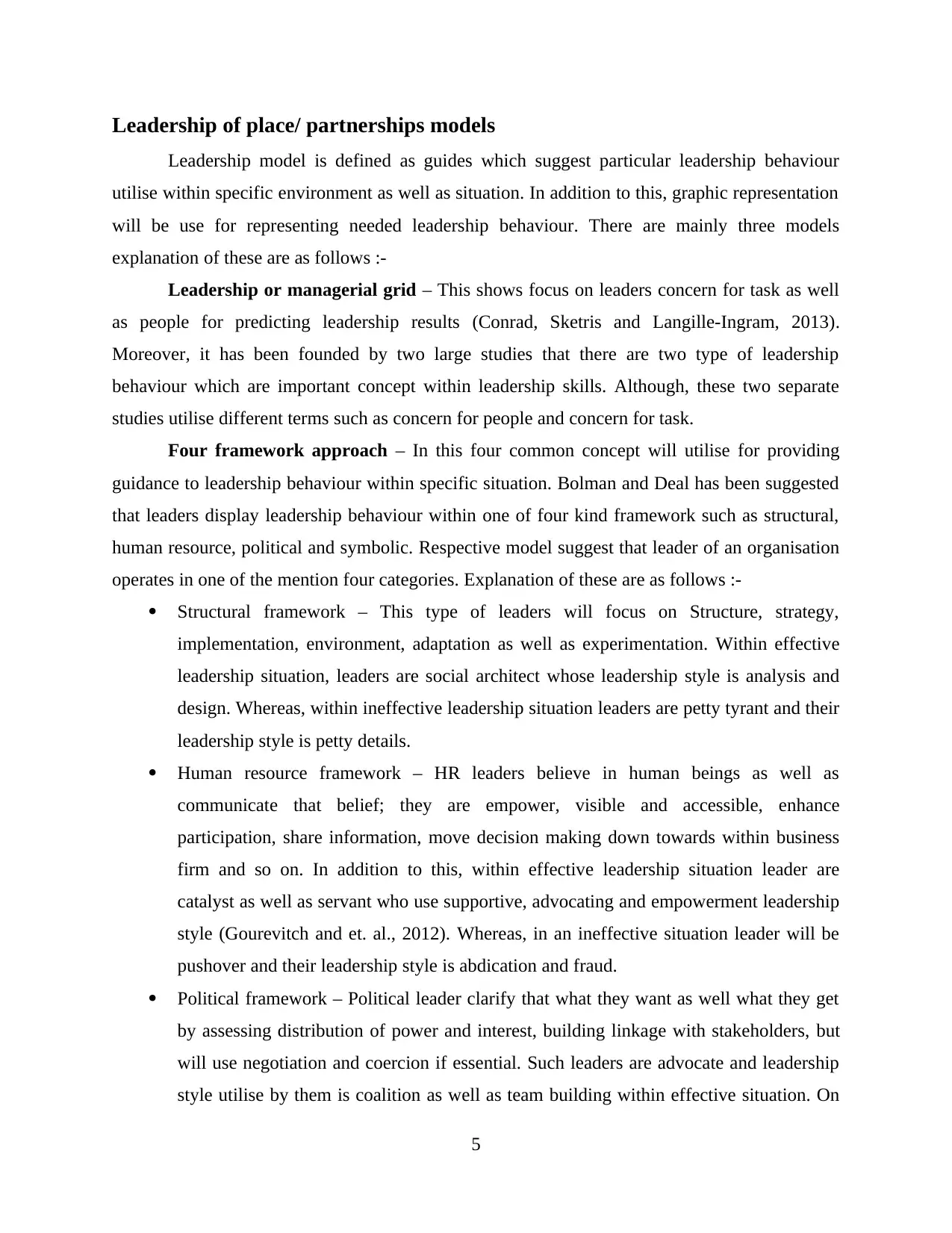
Leadership of place/ partnerships models
Leadership model is defined as guides which suggest particular leadership behaviour
utilise within specific environment as well as situation. In addition to this, graphic representation
will be use for representing needed leadership behaviour. There are mainly three models
explanation of these are as follows :-
Leadership or managerial grid – This shows focus on leaders concern for task as well
as people for predicting leadership results (Conrad, Sketris and Langille-Ingram, 2013).
Moreover, it has been founded by two large studies that there are two type of leadership
behaviour which are important concept within leadership skills. Although, these two separate
studies utilise different terms such as concern for people and concern for task.
Four framework approach – In this four common concept will utilise for providing
guidance to leadership behaviour within specific situation. Bolman and Deal has been suggested
that leaders display leadership behaviour within one of four kind framework such as structural,
human resource, political and symbolic. Respective model suggest that leader of an organisation
operates in one of the mention four categories. Explanation of these are as follows :-
Structural framework – This type of leaders will focus on Structure, strategy,
implementation, environment, adaptation as well as experimentation. Within effective
leadership situation, leaders are social architect whose leadership style is analysis and
design. Whereas, within ineffective leadership situation leaders are petty tyrant and their
leadership style is petty details.
Human resource framework – HR leaders believe in human beings as well as
communicate that belief; they are empower, visible and accessible, enhance
participation, share information, move decision making down towards within business
firm and so on. In addition to this, within effective leadership situation leader are
catalyst as well as servant who use supportive, advocating and empowerment leadership
style (Gourevitch and et. al., 2012). Whereas, in an ineffective situation leader will be
pushover and their leadership style is abdication and fraud.
Political framework – Political leader clarify that what they want as well what they get
by assessing distribution of power and interest, building linkage with stakeholders, but
will use negotiation and coercion if essential. Such leaders are advocate and leadership
style utilise by them is coalition as well as team building within effective situation. On
5
Leadership model is defined as guides which suggest particular leadership behaviour
utilise within specific environment as well as situation. In addition to this, graphic representation
will be use for representing needed leadership behaviour. There are mainly three models
explanation of these are as follows :-
Leadership or managerial grid – This shows focus on leaders concern for task as well
as people for predicting leadership results (Conrad, Sketris and Langille-Ingram, 2013).
Moreover, it has been founded by two large studies that there are two type of leadership
behaviour which are important concept within leadership skills. Although, these two separate
studies utilise different terms such as concern for people and concern for task.
Four framework approach – In this four common concept will utilise for providing
guidance to leadership behaviour within specific situation. Bolman and Deal has been suggested
that leaders display leadership behaviour within one of four kind framework such as structural,
human resource, political and symbolic. Respective model suggest that leader of an organisation
operates in one of the mention four categories. Explanation of these are as follows :-
Structural framework – This type of leaders will focus on Structure, strategy,
implementation, environment, adaptation as well as experimentation. Within effective
leadership situation, leaders are social architect whose leadership style is analysis and
design. Whereas, within ineffective leadership situation leaders are petty tyrant and their
leadership style is petty details.
Human resource framework – HR leaders believe in human beings as well as
communicate that belief; they are empower, visible and accessible, enhance
participation, share information, move decision making down towards within business
firm and so on. In addition to this, within effective leadership situation leader are
catalyst as well as servant who use supportive, advocating and empowerment leadership
style (Gourevitch and et. al., 2012). Whereas, in an ineffective situation leader will be
pushover and their leadership style is abdication and fraud.
Political framework – Political leader clarify that what they want as well what they get
by assessing distribution of power and interest, building linkage with stakeholders, but
will use negotiation and coercion if essential. Such leaders are advocate and leadership
style utilise by them is coalition as well as team building within effective situation. On
5
Paraphrase This Document
Need a fresh take? Get an instant paraphrase of this document with our AI Paraphraser
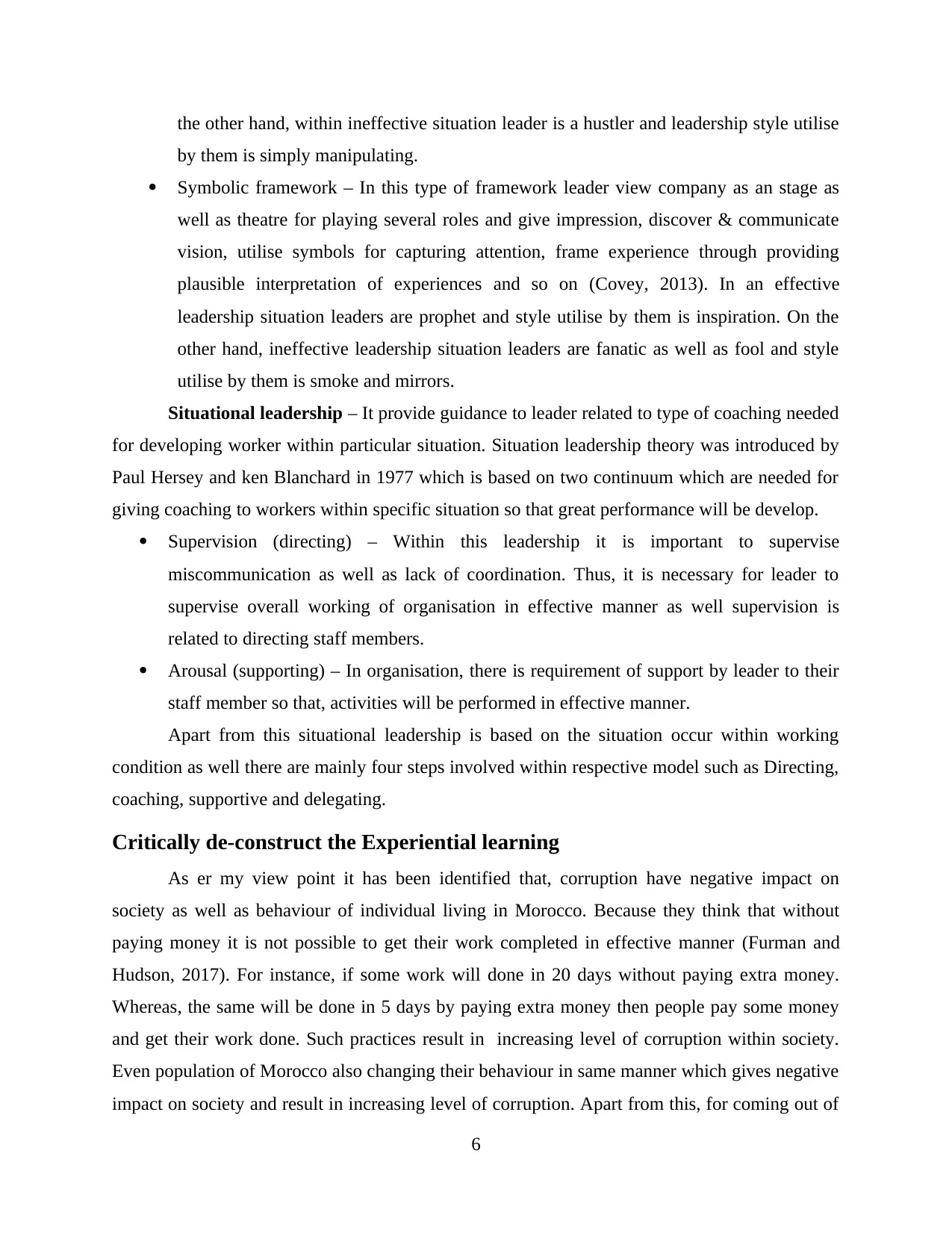
the other hand, within ineffective situation leader is a hustler and leadership style utilise
by them is simply manipulating.
Symbolic framework – In this type of framework leader view company as an stage as
well as theatre for playing several roles and give impression, discover & communicate
vision, utilise symbols for capturing attention, frame experience through providing
plausible interpretation of experiences and so on (Covey, 2013). In an effective
leadership situation leaders are prophet and style utilise by them is inspiration. On the
other hand, ineffective leadership situation leaders are fanatic as well as fool and style
utilise by them is smoke and mirrors.
Situational leadership – It provide guidance to leader related to type of coaching needed
for developing worker within particular situation. Situation leadership theory was introduced by
Paul Hersey and ken Blanchard in 1977 which is based on two continuum which are needed for
giving coaching to workers within specific situation so that great performance will be develop.
Supervision (directing) – Within this leadership it is important to supervise
miscommunication as well as lack of coordination. Thus, it is necessary for leader to
supervise overall working of organisation in effective manner as well supervision is
related to directing staff members.
Arousal (supporting) – In organisation, there is requirement of support by leader to their
staff member so that, activities will be performed in effective manner.
Apart from this situational leadership is based on the situation occur within working
condition as well there are mainly four steps involved within respective model such as Directing,
coaching, supportive and delegating.
Critically de-construct the Experiential learning
As er my view point it has been identified that, corruption have negative impact on
society as well as behaviour of individual living in Morocco. Because they think that without
paying money it is not possible to get their work completed in effective manner (Furman and
Hudson, 2017). For instance, if some work will done in 20 days without paying extra money.
Whereas, the same will be done in 5 days by paying extra money then people pay some money
and get their work done. Such practices result in increasing level of corruption within society.
Even population of Morocco also changing their behaviour in same manner which gives negative
impact on society and result in increasing level of corruption. Apart from this, for coming out of
6
by them is simply manipulating.
Symbolic framework – In this type of framework leader view company as an stage as
well as theatre for playing several roles and give impression, discover & communicate
vision, utilise symbols for capturing attention, frame experience through providing
plausible interpretation of experiences and so on (Covey, 2013). In an effective
leadership situation leaders are prophet and style utilise by them is inspiration. On the
other hand, ineffective leadership situation leaders are fanatic as well as fool and style
utilise by them is smoke and mirrors.
Situational leadership – It provide guidance to leader related to type of coaching needed
for developing worker within particular situation. Situation leadership theory was introduced by
Paul Hersey and ken Blanchard in 1977 which is based on two continuum which are needed for
giving coaching to workers within specific situation so that great performance will be develop.
Supervision (directing) – Within this leadership it is important to supervise
miscommunication as well as lack of coordination. Thus, it is necessary for leader to
supervise overall working of organisation in effective manner as well supervision is
related to directing staff members.
Arousal (supporting) – In organisation, there is requirement of support by leader to their
staff member so that, activities will be performed in effective manner.
Apart from this situational leadership is based on the situation occur within working
condition as well there are mainly four steps involved within respective model such as Directing,
coaching, supportive and delegating.
Critically de-construct the Experiential learning
As er my view point it has been identified that, corruption have negative impact on
society as well as behaviour of individual living in Morocco. Because they think that without
paying money it is not possible to get their work completed in effective manner (Furman and
Hudson, 2017). For instance, if some work will done in 20 days without paying extra money.
Whereas, the same will be done in 5 days by paying extra money then people pay some money
and get their work done. Such practices result in increasing level of corruption within society.
Even population of Morocco also changing their behaviour in same manner which gives negative
impact on society and result in increasing level of corruption. Apart from this, for coming out of
6
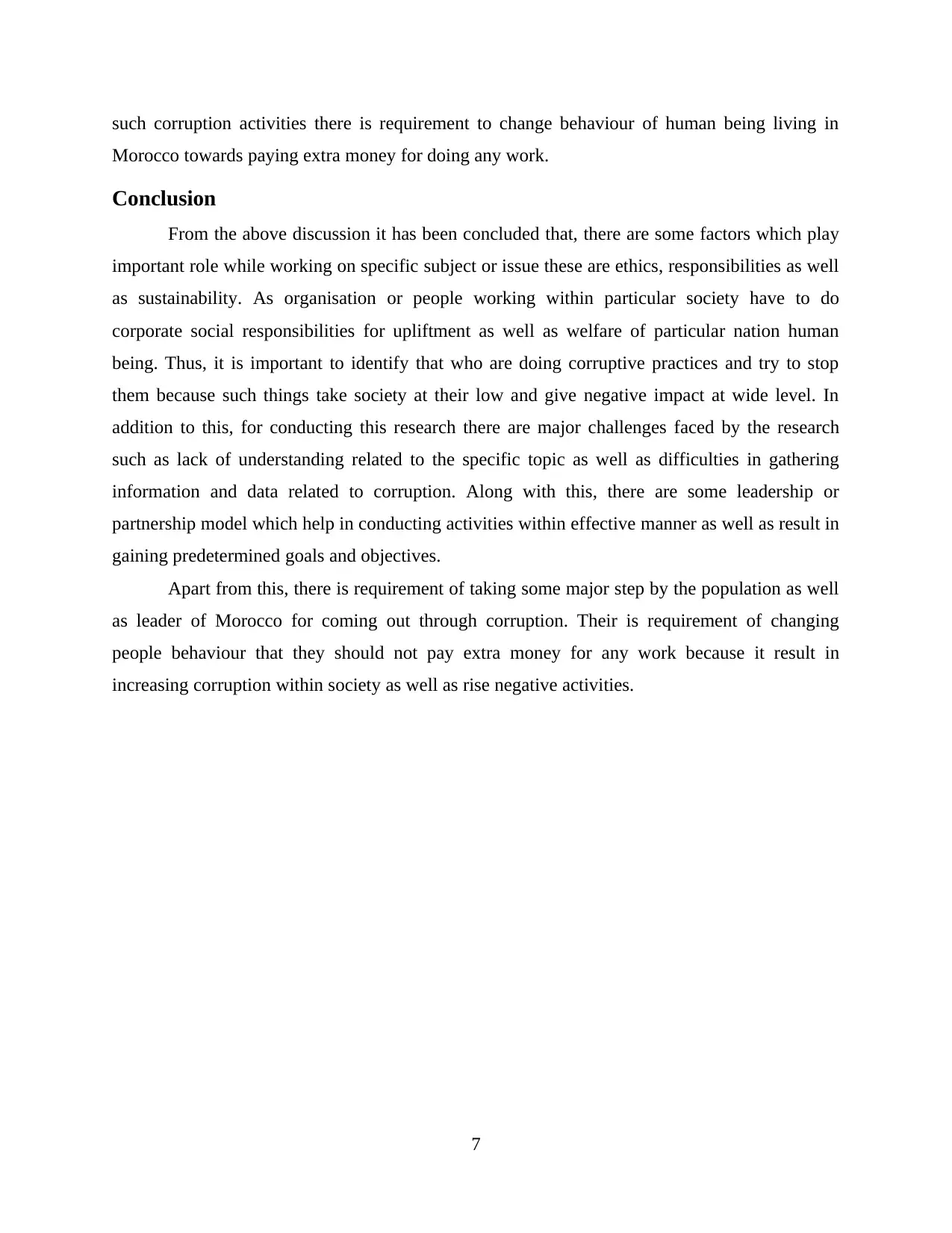
such corruption activities there is requirement to change behaviour of human being living in
Morocco towards paying extra money for doing any work.
Conclusion
From the above discussion it has been concluded that, there are some factors which play
important role while working on specific subject or issue these are ethics, responsibilities as well
as sustainability. As organisation or people working within particular society have to do
corporate social responsibilities for upliftment as well as welfare of particular nation human
being. Thus, it is important to identify that who are doing corruptive practices and try to stop
them because such things take society at their low and give negative impact at wide level. In
addition to this, for conducting this research there are major challenges faced by the research
such as lack of understanding related to the specific topic as well as difficulties in gathering
information and data related to corruption. Along with this, there are some leadership or
partnership model which help in conducting activities within effective manner as well as result in
gaining predetermined goals and objectives.
Apart from this, there is requirement of taking some major step by the population as well
as leader of Morocco for coming out through corruption. Their is requirement of changing
people behaviour that they should not pay extra money for any work because it result in
increasing corruption within society as well as rise negative activities.
7
Morocco towards paying extra money for doing any work.
Conclusion
From the above discussion it has been concluded that, there are some factors which play
important role while working on specific subject or issue these are ethics, responsibilities as well
as sustainability. As organisation or people working within particular society have to do
corporate social responsibilities for upliftment as well as welfare of particular nation human
being. Thus, it is important to identify that who are doing corruptive practices and try to stop
them because such things take society at their low and give negative impact at wide level. In
addition to this, for conducting this research there are major challenges faced by the research
such as lack of understanding related to the specific topic as well as difficulties in gathering
information and data related to corruption. Along with this, there are some leadership or
partnership model which help in conducting activities within effective manner as well as result in
gaining predetermined goals and objectives.
Apart from this, there is requirement of taking some major step by the population as well
as leader of Morocco for coming out through corruption. Their is requirement of changing
people behaviour that they should not pay extra money for any work because it result in
increasing corruption within society as well as rise negative activities.
7
⊘ This is a preview!⊘
Do you want full access?
Subscribe today to unlock all pages.

Trusted by 1+ million students worldwide
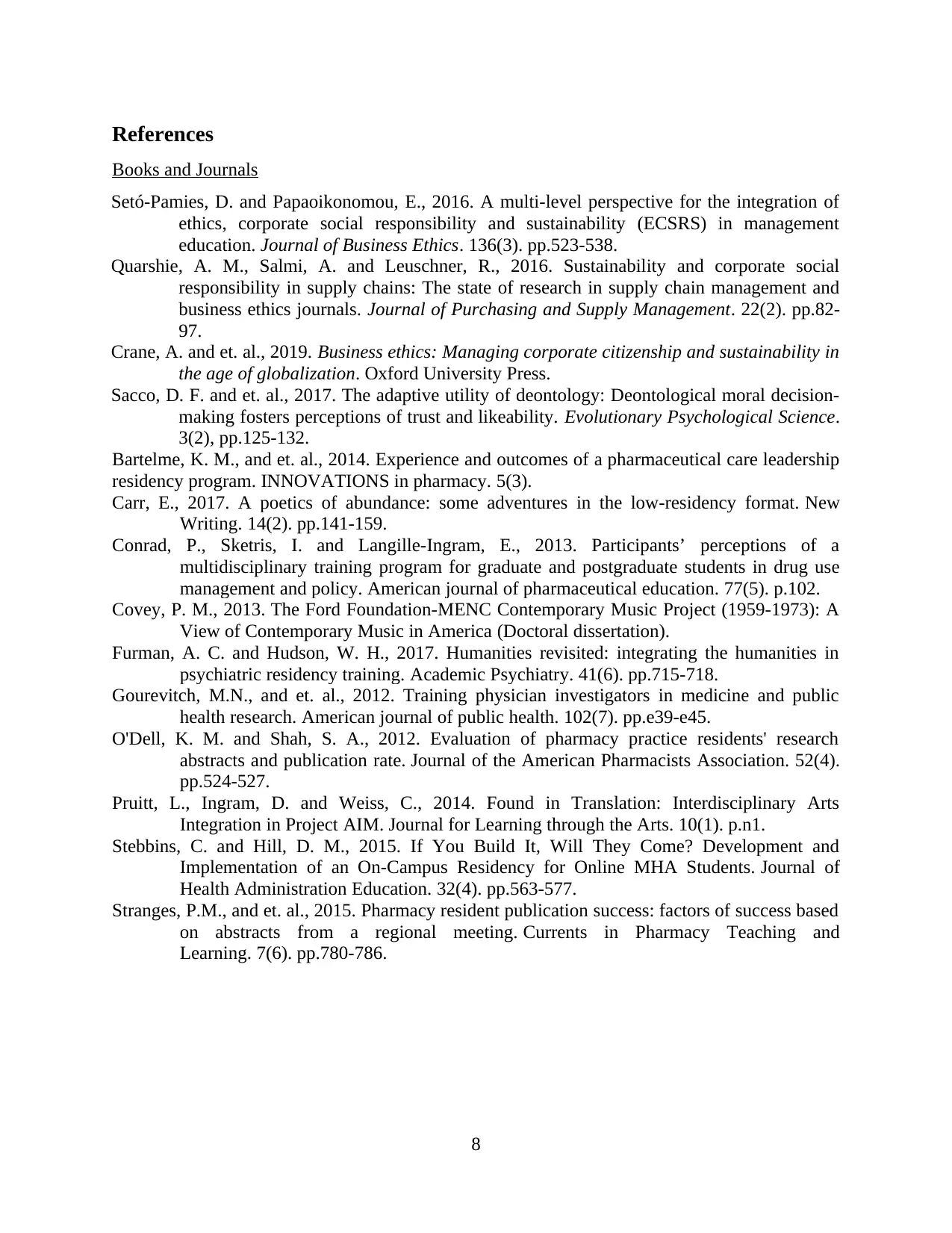
References
Books and Journals
Setó-Pamies, D. and Papaoikonomou, E., 2016. A multi-level perspective for the integration of
ethics, corporate social responsibility and sustainability (ECSRS) in management
education. Journal of Business Ethics. 136(3). pp.523-538.
Quarshie, A. M., Salmi, A. and Leuschner, R., 2016. Sustainability and corporate social
responsibility in supply chains: The state of research in supply chain management and
business ethics journals. Journal of Purchasing and Supply Management. 22(2). pp.82-
97.
Crane, A. and et. al., 2019. Business ethics: Managing corporate citizenship and sustainability in
the age of globalization. Oxford University Press.
Sacco, D. F. and et. al., 2017. The adaptive utility of deontology: Deontological moral decision-
making fosters perceptions of trust and likeability. Evolutionary Psychological Science.
3(2), pp.125-132.
Bartelme, K. M., and et. al., 2014. Experience and outcomes of a pharmaceutical care leadership
residency program. INNOVATIONS in pharmacy. 5(3).
Carr, E., 2017. A poetics of abundance: some adventures in the low-residency format. New
Writing. 14(2). pp.141-159.
Conrad, P., Sketris, I. and Langille-Ingram, E., 2013. Participants’ perceptions of a
multidisciplinary training program for graduate and postgraduate students in drug use
management and policy. American journal of pharmaceutical education. 77(5). p.102.
Covey, P. M., 2013. The Ford Foundation-MENC Contemporary Music Project (1959-1973): A
View of Contemporary Music in America (Doctoral dissertation).
Furman, A. C. and Hudson, W. H., 2017. Humanities revisited: integrating the humanities in
psychiatric residency training. Academic Psychiatry. 41(6). pp.715-718.
Gourevitch, M.N., and et. al., 2012. Training physician investigators in medicine and public
health research. American journal of public health. 102(7). pp.e39-e45.
O'Dell, K. M. and Shah, S. A., 2012. Evaluation of pharmacy practice residents' research
abstracts and publication rate. Journal of the American Pharmacists Association. 52(4).
pp.524-527.
Pruitt, L., Ingram, D. and Weiss, C., 2014. Found in Translation: Interdisciplinary Arts
Integration in Project AIM. Journal for Learning through the Arts. 10(1). p.n1.
Stebbins, C. and Hill, D. M., 2015. If You Build It, Will They Come? Development and
Implementation of an On-Campus Residency for Online MHA Students. Journal of
Health Administration Education. 32(4). pp.563-577.
Stranges, P.M., and et. al., 2015. Pharmacy resident publication success: factors of success based
on abstracts from a regional meeting. Currents in Pharmacy Teaching and
Learning. 7(6). pp.780-786.
8
Books and Journals
Setó-Pamies, D. and Papaoikonomou, E., 2016. A multi-level perspective for the integration of
ethics, corporate social responsibility and sustainability (ECSRS) in management
education. Journal of Business Ethics. 136(3). pp.523-538.
Quarshie, A. M., Salmi, A. and Leuschner, R., 2016. Sustainability and corporate social
responsibility in supply chains: The state of research in supply chain management and
business ethics journals. Journal of Purchasing and Supply Management. 22(2). pp.82-
97.
Crane, A. and et. al., 2019. Business ethics: Managing corporate citizenship and sustainability in
the age of globalization. Oxford University Press.
Sacco, D. F. and et. al., 2017. The adaptive utility of deontology: Deontological moral decision-
making fosters perceptions of trust and likeability. Evolutionary Psychological Science.
3(2), pp.125-132.
Bartelme, K. M., and et. al., 2014. Experience and outcomes of a pharmaceutical care leadership
residency program. INNOVATIONS in pharmacy. 5(3).
Carr, E., 2017. A poetics of abundance: some adventures in the low-residency format. New
Writing. 14(2). pp.141-159.
Conrad, P., Sketris, I. and Langille-Ingram, E., 2013. Participants’ perceptions of a
multidisciplinary training program for graduate and postgraduate students in drug use
management and policy. American journal of pharmaceutical education. 77(5). p.102.
Covey, P. M., 2013. The Ford Foundation-MENC Contemporary Music Project (1959-1973): A
View of Contemporary Music in America (Doctoral dissertation).
Furman, A. C. and Hudson, W. H., 2017. Humanities revisited: integrating the humanities in
psychiatric residency training. Academic Psychiatry. 41(6). pp.715-718.
Gourevitch, M.N., and et. al., 2012. Training physician investigators in medicine and public
health research. American journal of public health. 102(7). pp.e39-e45.
O'Dell, K. M. and Shah, S. A., 2012. Evaluation of pharmacy practice residents' research
abstracts and publication rate. Journal of the American Pharmacists Association. 52(4).
pp.524-527.
Pruitt, L., Ingram, D. and Weiss, C., 2014. Found in Translation: Interdisciplinary Arts
Integration in Project AIM. Journal for Learning through the Arts. 10(1). p.n1.
Stebbins, C. and Hill, D. M., 2015. If You Build It, Will They Come? Development and
Implementation of an On-Campus Residency for Online MHA Students. Journal of
Health Administration Education. 32(4). pp.563-577.
Stranges, P.M., and et. al., 2015. Pharmacy resident publication success: factors of success based
on abstracts from a regional meeting. Currents in Pharmacy Teaching and
Learning. 7(6). pp.780-786.
8
1 out of 10
Your All-in-One AI-Powered Toolkit for Academic Success.
+13062052269
info@desklib.com
Available 24*7 on WhatsApp / Email
![[object Object]](/_next/static/media/star-bottom.7253800d.svg)
Unlock your academic potential
Copyright © 2020–2026 A2Z Services. All Rights Reserved. Developed and managed by ZUCOL.